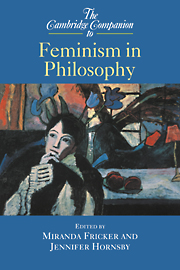Book contents
- Frontmatter
- Introduction
- 1 Feminism in ancient philosophy
- 2 Feminism in philosophy of mind
- 3 Feminism in philosophy of mind
- 4 Feminism and psychoanalysis
- 5 Feminism in philosophy of language
- 6 Feminism in metaphysics
- 7 Feminism in epistemology
- 8 Feminism in epistemology
- 9 Feminism in philosophy of science
- 10 Feminism in political philosophy
- 11 Feminism in ethics
- 12 Feminism in ethics
- 13 Feminism in history of philosophy
- Further reading
- Index
8 - Feminism in epistemology
Pluralism without postmodernism
Published online by Cambridge University Press: 28 May 2006
- Frontmatter
- Introduction
- 1 Feminism in ancient philosophy
- 2 Feminism in philosophy of mind
- 3 Feminism in philosophy of mind
- 4 Feminism and psychoanalysis
- 5 Feminism in philosophy of language
- 6 Feminism in metaphysics
- 7 Feminism in epistemology
- 8 Feminism in epistemology
- 9 Feminism in philosophy of science
- 10 Feminism in political philosophy
- 11 Feminism in ethics
- 12 Feminism in ethics
- 13 Feminism in history of philosophy
- Further reading
- Index
Summary
Those Greeks were superficial - out of profundity.
NietzscheIntroduction
Someone might wonder how there can be feminist epistemology - 'knowledge is simply knowledge, regardless of gender, and that's all there is to it'. There are philosophers of a relativistic mindset, some feminists among them, who would challenge the idea that knowledge is 'simply' knowledge, believing it to be both less and more than it seems. Those, for instance, who regard 'true' as an 'empty compliment' that we pay to propositions we want to endorse, or as part of a philosophical 'discourse of legitimation', will regard 'knowledge' too as a metaphysically empty stamp of approval. Metaphysically speaking, then, they believe knowledge to be less than it seems. But politically speaking, they believe it to be more than it seems; for once their view of knowledge is in place, it is only a small step to the suggestion that propositions approved as knowledge are likely to reflect the perspectives and even serve the interests of those whose social power shapes the practices of approval. Since being female has placed one historically at the less powerful end of gender relations, it would be easy then to see how there could be a role for feminism in the theory of knowledge. Feminism would have a ready-made task in counteracting and protecting against gender bias in the processes and institutions of approval.
- Type
- Chapter
- Information
- The Cambridge Companion to Feminism in Philosophy , pp. 146 - 165Publisher: Cambridge University PressPrint publication year: 2000
- 11
- Cited by

